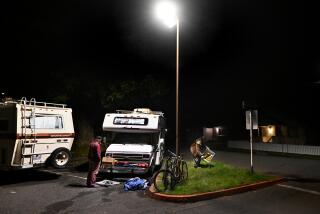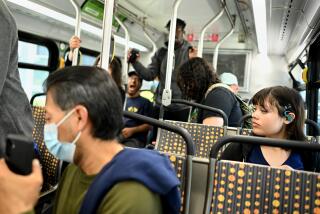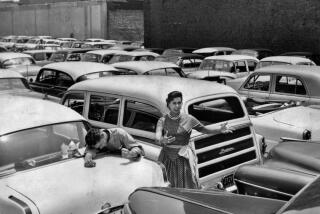Getting people into car pools? Sounds like a job for Wonder Woman
- Share via
She weighs about 135 pounds and she is trying to halt millions of tons of steel and glass hurtling straight for the South Bay.
No, it is not the latest adventure of Wonder Woman, the intrepid Amazon who could deflect disaster with her magic bracelet and a few deft wrist movements.
Kelly Peterson, a well-groomed 26-year-old with a shock of straight-up hair, has no magic bracelet to change the minds and habits of everyone who drives. To get them to drive less. To use a bus. To ride with other people.
In short, she is trying to get people to give up what many view as a constitutional right to go wherever they want whenever they want . . . all by themselves . . . while listening to their favorite radio station.
“We are so stuck in our ways,” Peterson says.
She and her colleague, Bennie Bensimon, are the South Bay end of Commuter Computer--the nonprofit outfit behind those freeway signs urging would-be car-poolers to call 380-RIDE.
Like sales people, the two women travel from company to company, pitching car-pool and van-pool programs to management and employee groups. They talk about the savings in not using a car for commuting (up to $2,000 a year, they say), the friendships that car pools can establish, the do’s and don’ts of car-pool etiquette.
Peterson watches over Torrance, the Palos Verdes Peninsula, Gardena, Redondo Beach, Hermosa Beach, Hawthorne and Lawndale. Bensimon takes care of Manhattan Beach, El Segundo and Westchester.
It is a life with small satisfactions--a car pool started here, a company bus line extended there--and frustrations as large as the traffic jams that clog the arteries of the South Bay. Although the movement has been making gains in recent years, sometimes the sheer magnitude of the task seems overwhelming.
“I start my day in traffic. I talk about traffic all day and I end my day in traffic,” Peterson says wearily.
Bensimon says moments of doubt about the point of it all inevitably strike in the middle of a traffic jam.
“What kind of person am I?” she asks herself then. “I get excited about putting someone in a car pool. This is ridiculous!”
Traffic is getting worse, by all accounts.
“Ride-sharing”--car-pooling is such a dirty word to die-hard commuters that Commuter Computer staffers avoid it--is well below the levels reached during the 1973 oil embargo. At that time, about half a million were interested in car pools here, according to Commuter Computer’s estimates; millions more waited in gas lines and Computer Commuter itself was created with the support of a variety of governmental and business groups. The most recent figures show about 150,000 people to be interested in car pools, with 107,000 actually riding in them, according to Commuter Computer.
While ride-sharing has been gaining ground slowly in recent years--thanks in part to a special effort during the 1984 Olympics--Commuter Computer acknowledges that the increase is more than offset by growth in the number of cars.
Of course, there is hope not too far down the road for Peterson and Bensimon. But good news for them may be bad news for others.
The recent oil glut that lowered prices and revived gas-guzzling ways has led to a major increase in the percentage of oil that is imported. Government analysts reason that the eventual outcome in the 1990s will be the restoration of OPEC’s power to set oil prices and the use of oil as a political weapon against the United States.
Commuter Computer reasons that car pools may come back into vogue when the crunch returns.
Such geopolitical considerations were not the main issues when Peterson visited the offices of Epson America Inc. in Torrance the other day to explain the ins and outs of car-pooling at the invitation of an enthusiastic management.
Behind her, a map showed the home locations of employees interested in car pools.
“This is the wave of the future,” she told the group. “One mile of freeway costs $250 million. Metro Rail? That’s not going to help us--if it comes. This is the most inexpensive way.
“We were started because of the oil crisis in the early 1970s. The traffic situation got worse and worse. Now the projections have become reality. Congestion is getting worse.”
Commuter Computer has reservations about Metro Rail, which is designed to serve the Westside and the San Fernando Valley and will not reach into the South Bay. The organization’s favorite mass transit alternative, naturally enough, is the addition of car-pool lanes on freeways. It opposes as a matter of policy the practice of providing free parking to employees.
In a question-and-answer session, one Epson employee wanted to know the cost of joining a van pool. In a van pool, where the vehicle is rented, the average cost, including rent, gasoline and insurance, is $45 a month per person, Peterson said. Another wanted to know if Commuter Computer finds out when car pools do not work out. “I don’t know,” Peterson replied, but added that an important factor in keeping car pools together is sensitivity to passengers’ needs. As an example, she said, as a matter of etiquette, drivers should not shop for groceries until the last person had been dropped off.
The group was enthusiastic enough, but it was too small for her liking. Only a dozen of Epson’s 550 employees showed up. Fifty-two had signed up.
Peterson put a good face on the visit, although she admitted afterward that she was disappointed at the meager turnout. Most companies make attendance at the organizational meeting mandatory, she later told Allan P. Krippner, Epson’s director of human resources.
Then she glanced at her watch. “Let’s see, gridlock has started. I’ll be here until I get my nerve up to go out and face traffic.”
In an irony of which she is all too conscious, Peterson, like others who must travel during the workday, finds it impossible to use a car pool.
“I live in Grenada Hills,” she said. “No, I don’t car pool because I am a field person. Once a week, I work from home. That is my contribution.”






